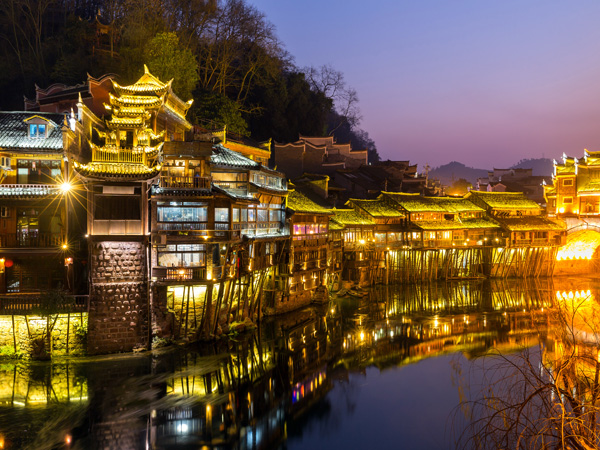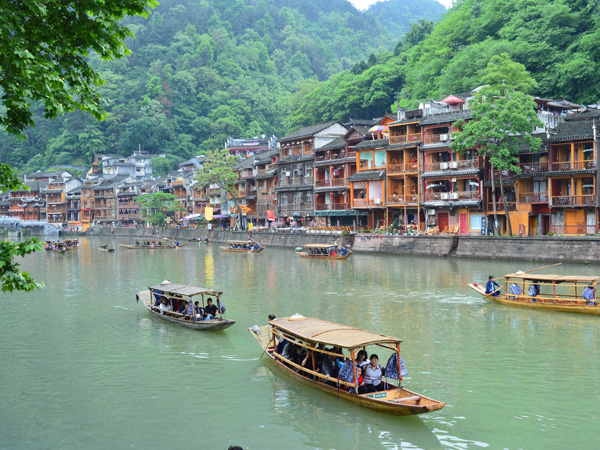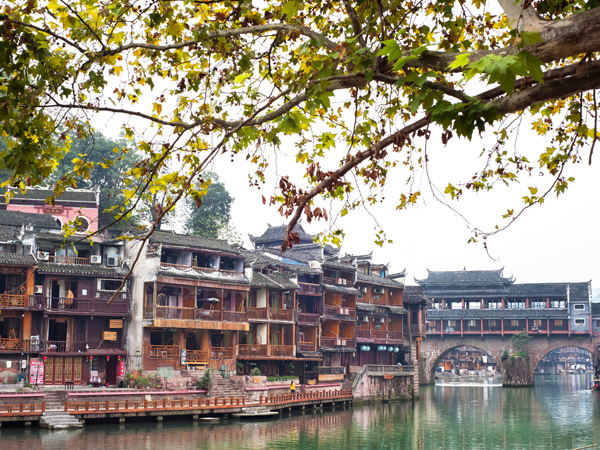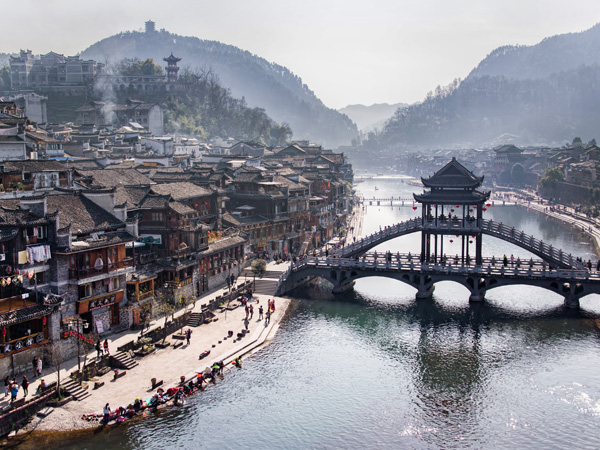Hunan Fenghuang (Phoenix) Ancient Town, an old town built up in Qing Dynasty, is still being kept in its original appearance with 300 years passed. The ancient town is located in the southwest of Hunan Province, bordering the prefecture-level cities of Huaihua to the southeast and Tongren (Guizhou) to the west. It is 37km(about 50 minutes’ driving) away from the nearest city-Jishou City, 430km (about 5 hours’ driving) away from Changsha, 250km (about 3 hours’ driving) away from Zhangjiajjie. Covering an area of 1.8 km, the ancient city is a gathering place for Miao and Tujia ethnic minority.

Ranking as the top ancient town in China, Fenghuang Ancient Town is a guidebook for people to know the past life in the pre-modernization period. The wooden houses and stone roads are the typical scenes here. When sightseeing in this town in a misty day, you will really find why it is so famous and popular all the time. The scenery after rain or in the misty morning is more like a Chinese traditional painting rather than a real world.
It was built in 1704, and has 300 years of history. Fenghuang ancient town was added to the UNESCO World Heritage Tentative List on March 28, 2008 in the Cultural category. This ancient town was regarded as the most beautiful town in China by New Zealand writer Rewi Alley.
Fenghuang Ancient Town can be divided into two parts. One is the old town while the other one is new town. The old one leans against hills and faces the crystal-clear Tuojiang River flowing through the city, and it is the main tourist area in county. The new town is normal residential area for local people.
What to See in Fenghuang Ancient Town
The typical building in Fenghuang is called Diaojiaolou which is a unique wooden houses built along the river bank. When seeing from a distance, the houses look like hanging on the river. This design is to protect the house from the flooding situation in Tuojiang River in the old time.

The southern Great Wall, a part of the Ming Great Wall, is a unique scene here. In Ming Dynasty, the Southern Great Wall was built for preventing the local Han Chinese from the invasion of Miao minority. While nowadays, Miao people have became a part of Chinese ethnic groups and get well with Han people. So Fenghuang Ancient Town is also a place to experience the Chinese ethnic culture.
There remain 20 ancient streets, dozens of ancient lanes and passages and over 200 ancient civil residences here, including Huangsiqiao Castle, Xiangxi Border Walls, Chaoyang Palace, Longevity Palace, Heavenly King Temple, Former Resident of Shen Chongwen, Former Resident of Xiong Xiling, and many other former residences of celebrities and historical and cultural sites. If time allows, you may visit them one by one. But entrance fee will be charged to visit these former residences or historical and cultural sites.
Another interesting thing to do would be taking a boat cruise along Tuojiang River. Stretching diagonally from the northwest to southeast of the town, Tuojiang River is a life force of the local people. Here in its waters women wash their clothes and the men fish with their nets, while on the bank food is prepared in much the same way as it has for centuries. And taking a boat is a good way to see how Diaojiaolou building stands along the river and get close to the local life.

The ethnicity colors of Tujia and Miao people are also one of the major attracts. You will see some old women wearing their ethnic costume, standing beside the lanes and selling specialties.
Scenic Spots in Fenghuang Ancient Town
• Yang Ancestral Memorial
Yang Ancestral Memorial is located in the northeast side of Tuojiang River, inside Fenghuang Ancient Town Scenic Area, in southwest of Huangnan Province, China. It was originally built in 1836 during the reign of Daoguang Emperor in Qing Dynasty, and now it is the only and well-preserved Ancestral Memorial in Fenghuang Ancient Town. It covers an area about 770 square meters. The elaborate structure and considerable design makes Yang Ancestral Memorial as an outstanding building till now.
Whole of this family temple features the special ethnic characters and the high value in architecture field. This temple is a wood-made courtyard with two floors, consisting of the gate, opera stage, corridors, main hall and subsidiary rooms. It is strongly showing the local tradition and carving art of architecture. Currently it is the cultural site under the county-level protection.
• Tuojiang River
Xiangxi Tuojiang River is the mother river of the Fenghuang Ancient City, a small city under the jurisdiction of the Tujia Autonomous Prefecture of Hunan Province, borders northern Guizhou Province and eastern Chongqing Municipality. It flows around the ancient city wall of Fenghuang slowly, nurturing the people of the town for generations. Tuijiang River has a total length of 131 kilometers, 96.9 kilometers of which flows through Fenghuang area. Tuojiang River is surrounded by and reflects multiple-storey wooden houses of the Tu minority’s style (known as “Diaojiaolou”) in Fenghuang ancient town. These hundreds of years’ buildings add more colors to Tuojiang River.
• Ancient East Gate
Ancient East Gate is a scenic area located in the east side of Fenghuang Ancient Town. And it was originally called Shengheng Gate as one of the four town gate in Fenghuang Ancient Town. The East Gate Tower is close to Tuo River, built in the 54 year (1715) during the reign of Emperor Kangxi in the Qing Dynasty (1616 AD-1911 AD).
Taking the front gate in Beijing City as example, the East Gate Tower is a two-storied architecture. The lower section of the town gate is made of the mauve sandstone, and the upper section is made of the old bricks. It is 3.5 meters wide and 4 meters high. It looks like a semi-arch. The frame structure of the tower is a combination of the “beam supporting structure” and the “through type timber frame”.
• Former Residence of Shen Congwen
Former Residence of Shen Congwen in Fenghuang Ancient City features the Xiangxi architectural style as one of the national cultural heritages in Hunan province.
Situated in No. 10 on Zhongying Street in Fenghuang Ancient Town, the Former Residence of Shen Congwen is an outstanding culture relic in this town. This residence is the birthplace of Shen Congwen. The residence is a typical spacious ancient courtyard with special tectonic style of Ming and Qing Dynasties. It was constructed over 100 years ago by Shen Congwen’s father when serving in the Qing imperial government. The yard has passed down from generation to generation, experiencing historical vicissitude, and all the glory and honor have passed away with the time. Finally, it was listed as the key culture relic under provincial protection in 1991. Displaying the calligraphy work, manuscript and the portrait of Shen Congwen, the place has become one of the most popular cultural landscapes of Phoenix Town.
Shen Congwen, a great master of Chinese literature, left his childhood memory in this residence since 1902 to 1917. With a modest size, the wooden houses are roofed with dark gray tiles. The courtyard is paved with dark gray stone slabs with a large water vat in the middle. Shen’s original written essays, pictures and other works of him are exhibited in eight rooms separately.
According to its architectural style, this residence is a south courtyard which is different from northern ones. This Xiangxi architecture was built in Qing Dynasty, so people can trace the architectural style in that period from it. the Former Residence of Shen Congwen consists of 11 chambers with delicately-carved windows and a courtyard paved with red bricks.
How to Get to Fenghuang Ancient Town

Although there is no airport or train station in Fenghuang County, it is quite convenient to go to Fenghuang from nearby cities like Changsha, Huaihua, Jishou, Tongren and Zhangjiajie. The nearest airport Fenghuang Airport in Tongren City is only 34km away from Fenghuang County and the nearest train station in Jishou City is only 50km away. After arriving at Fenghuang Airport or Jishou Train Station, tourists may take a bus or taxi to Fenghuang County. Besides, Zhangjiajie Airport/train station, Changsha train station/Bus Station/Airport, or Huaihua Train Station are also often used as transfer stop for Fenghuang County.
From Changsha: There are a few coaches leaving for Fenghuang every day, from Changshan West Bus Station(长沙汽车西站)or Changsha Zhuran Bus Station(长沙株潭汽车站). As its schedule might change sometimes, you may check the bus schedule and book the bus tickets upon your arrival in the bus station.
From Huaiyuan: There are some high-speed train traveling between Huaihua and some other cities, such Shanghai, Changsha. Upon your arrival in Huaihua, you need to transfer to Huaihua West Bus Station to catch a coach to reach Fenghuang, which will take 1 hour only. And the coaches set off every 2 hours from 7:30am to 4:30pm.
From Zhangjiajie: You may take a coach at Zhangjiajie Bus Station(near Zhangjaijie Train Station) to get to Fenghuang directly. But there are only two or three coaches leaving for Fenghuang every day. So you have to make reservation as early as possible.
From Tongren: near to Tongren Train Station, there are direct coaches leaving for Fenghuang, which runs from 7:30am to 4:30pm daily and takes about 1 hour only.
Note: all the buses/coaches from other places will arrive at the North Bus Station of Fenghuang New Town(凤凰新城北汽车站), which still takes about 5 minutes’ driving to get to the ancient town area. You may walk or take a local taxi to get there.
Travel Guide
【Best time to visit】: From April to late October is the best time to visit. November to March is quite cold. 【Accommodation in Fenghuang】: There are a lot of choices for accommodation in Fenghuang, from well-equipped hotels to economic hostels. If you only accept well-equipped hotels, you can find them around the ancient town scenic area, within walking distance to the ancient town. If you want to save money and stay inside the ancient town scenic area, you can book a hostel inside the ancient town. There are a lot of hostels inside which is operated by local residents.
